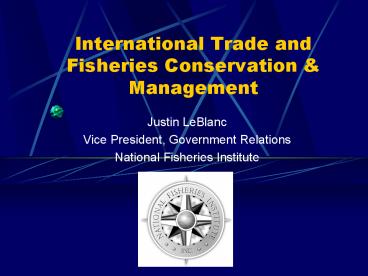International Trade and Fisheries Conservation - PowerPoint PPT Presentation
1 / 18
Title:
International Trade and Fisheries Conservation
Description:
AFF Indonesia. AFF Malaysia. AFF Philippines. AFF Singapore. AFF ... AFF Vietnam. Fisheries Association of Iceland. The Norwegian Fishermen's Association ... – PowerPoint PPT presentation
Number of Views:76
Avg rating:3.0/5.0
Title: International Trade and Fisheries Conservation
1
International Trade and Fisheries Conservation
Management
- Justin LeBlanc
- Vice President, Government Relations
- National Fisheries Institute
2
The National Fisheries Institute
- NFI is a water to table organization
- Fishing vessel owners
- Aquaculturalists
- Processors
- Importers
- Exporters
- Retailers
- Restaurants
3
The National Fisheries Institute
- NFI is committed to assisting our members provide
consumers with safe, sustainable, and diverse
seafood choices.
4
NFI is a Free and Fair Trade Organization
- To the extent that trade is either not free or
unfair, appropriate mitigating measures should be
taken. - NFI is not an appropriate determinant of when
trade is not free or unfair, such decisions
should be made by the International Trade
Commission based on the best information available
5
Defensive Data Dump
- The commercial fish and seafood industry employs
over 170,000 people on more than 123,000 fishing
vessels. - Seafood processing, distribution, and wholesale
operations employ an additional 116,000 people. - These individuals have nearly doubled their
contribution to the U.S. Gross National Product
(GNP) from 16.6 billion in 1990 to 27.8 billion
in 2000. - In addition, domestic aquaculture production
employs approximately 180,000 people and is
valued at approximately 900 million.
6
- From 1990 to 2000, domestic seafood landings have
remained relatively stable at an average 9.7
billion pounds valued at 3.5 billion. - Imports (edible) have increased from 2.9 billion
pounds worth 9 billion to 4.0 billion pounds
worth 19 billion. - Exports (edible) have remained stable at an
average 2 billion pounds while increasing in
value from 5.6 billion to 10.9 billion. - U.S. per capita seafood consumption has increased
from approximately 11 pounds at the beginning of
the last century to 15.6 pounds in 2000. A
record 16.2 pounds was consumed per capita in
1987.
7
Globally, the United States is
- the worlds fifth largest producer
- third largest exporter
- and second largest importer.
- While the U.S. is one of the lowest per capita
consumers of seafood, in total, the U.S. is the
fourth largest consumer of fish and seafood
products.
8
Trade as it relates to fisheries sustainability
- Tariffs no direct relationship
- Non-Tariff Trade Barriers positive and negative
relationships - Catch Documentation and Certification Schemes
- CITES
- Ecolabeling
9
NFI supports Zero for Zero
- In the ongoing WTO negotiations, NFI supports
reciprocal tariff elimination on a sectoral
basis. - The average U.S. tariff on imported fish
seafood is only around 2 - Exports face considerably higher barriers,
particularly into the EU and China - Longer-term phasing for sensitive tariff lines
10
Non-tariff trade actions
- Catch documentation and Certification Schemes
- CITES
- Ecolabeling
11
Catch Documentation and Certification Schemes
- Some U.S. producer organizations believe that
imports should be subject to the same
conservation standards as they are under MSFCMA,
ESA, MMPA, NEPA, etc. - Trade actions may supplement but can never
replace fisheries conservation management
regimes - Schemes that impose conservation burdens on
imports can promote sustainability
internationally, however
12
In order to ensure such schemes are fair and
truly focused on sustainability
- consistent with WTO rules obligations
- multilateral in nature
- with regard to HMS, initiated by the relevant
RFMO - As such schemes proliferate, standardization is
desirable - Creates incentives towards compliance
13
Unilateral actions
- Whether by governments or NGOs (consumer
boycotts) - May make consumers feel good about the particular
fish on their plate, but - Do little to promote conservation management
measures as producers shift distribution to less
stringent markets
14
CITES
- CITES has been proposed by some as a useful tool
- CITES lacks expertise in fisheries as well as
trade in what is essentially a food product - CITES must defer to the FAO on fisheries before
it can be considered a useful tool
15
Ecolabeling
- The FAO should develop internationally
agreed-too standards for the certification of
sustainable seafood - FAO standards are necessary to ensure
accountability, fairness, transparency, WTO
compatibility - In the absence of FAO standards, private sector
schemes may - Set standards too low to the detriment of fishery
resources - Set standards too high to the detriment of
fishing communities and the contribution of
fisheries to global food security
16
NFI and ICFA
- NFI serves as the Executive Secretariat of the
International Coalition of Fisheries Associations - ICFA has no position on tariff-related matters
- ICFA supports NFI position on catch documentation
certification, CITES, and Ecolabeling
17
(No Transcript)
18
ICFA Members
- Fisheries Association of China
- Japan Fisheries Association
- Federation of Japan Tuna Fisheries Cooperative
Associations - ASEAN Fisheries Federation
- AFF Brunie Darussalam
- AFF Indonesia
- AFF Malaysia
- AFF Philippines
- AFF Singapore
- AFF Thailand
- AFF Vietnam
- Fisheries Association of Iceland
- The Norwegian Fishermens Association
- Korea Deep Sea Fisheries Association
- All Russia Association of Fisheries Entrepreneurs
and Exporters - Fisheries Council of Canada
- Australia Seafood Industry Council
- The New Zealand Seafood Industry Council
- National Fisheries Institute (USA)































